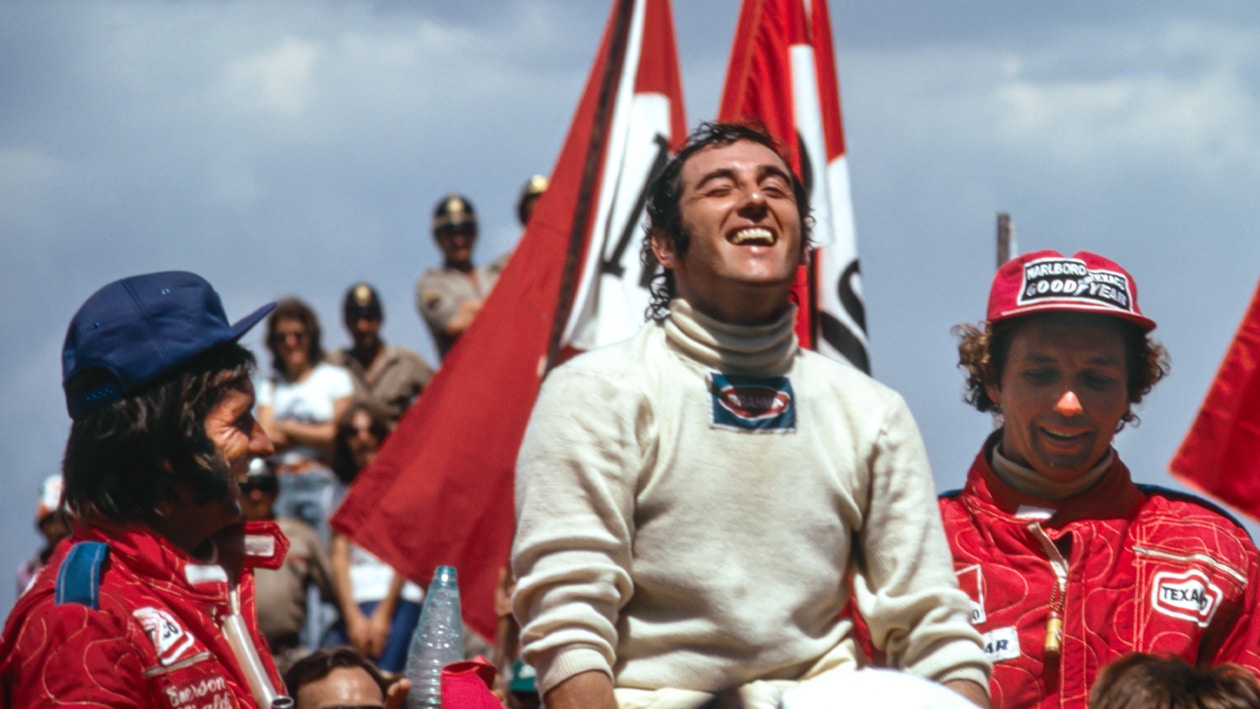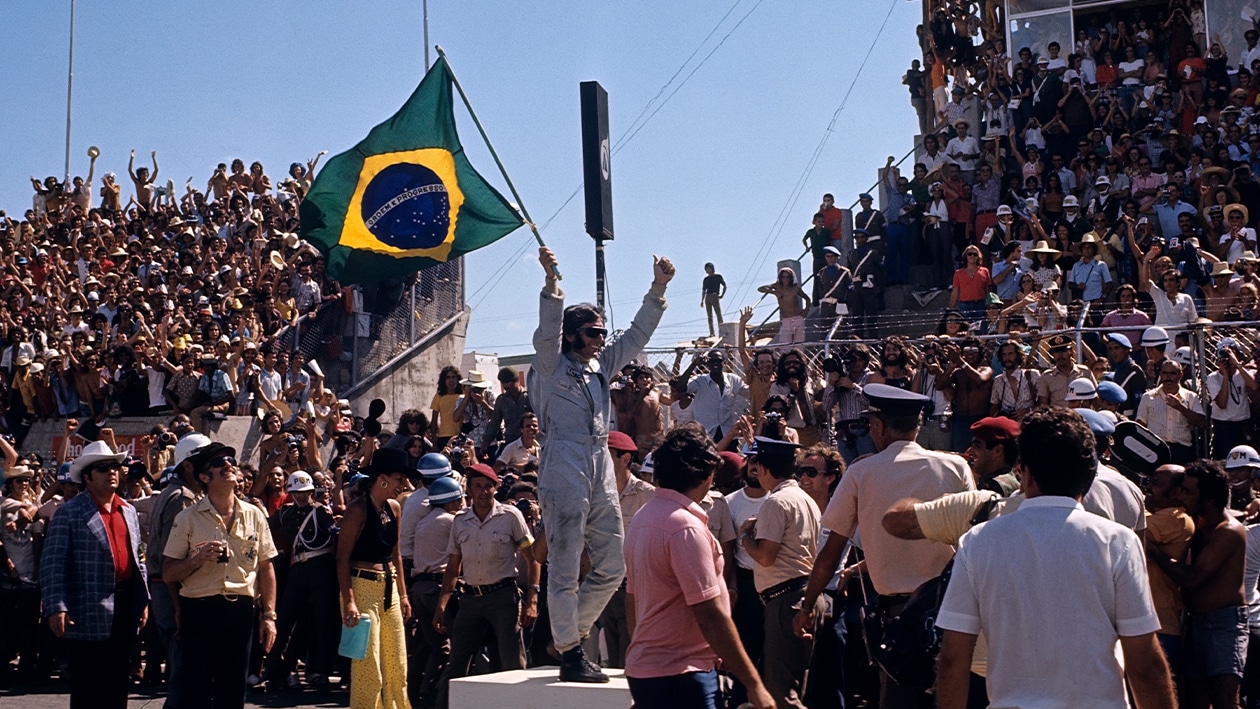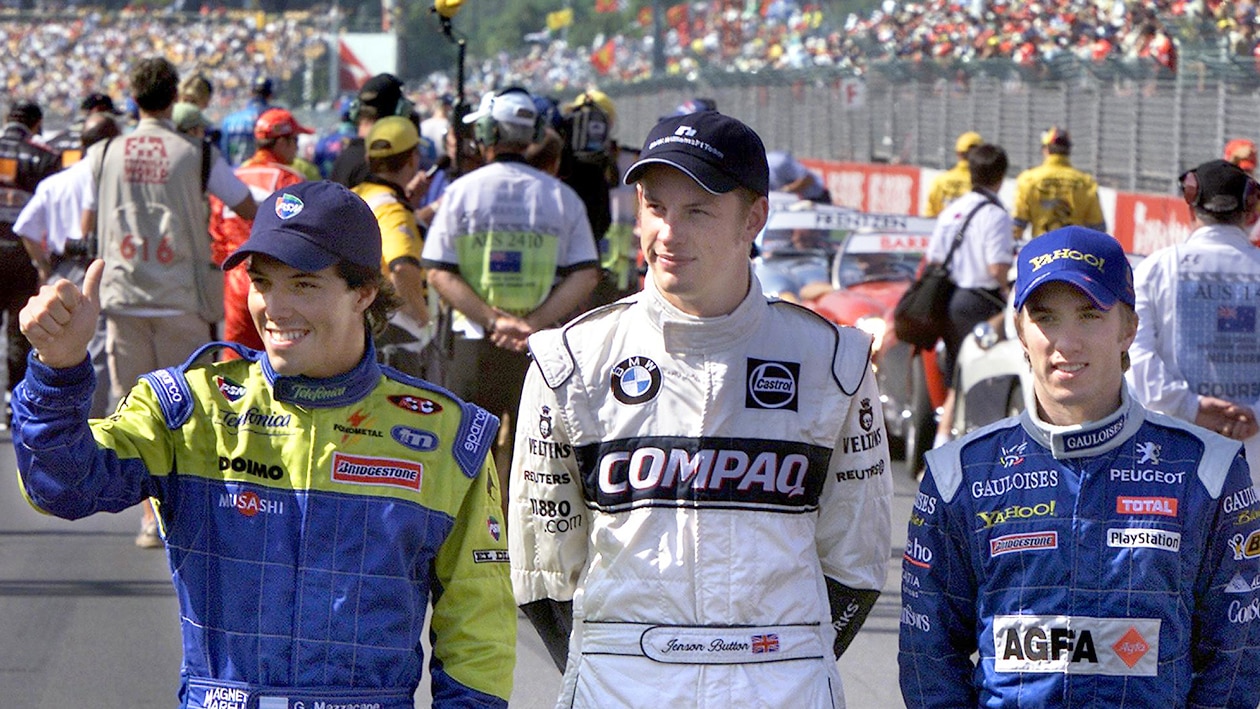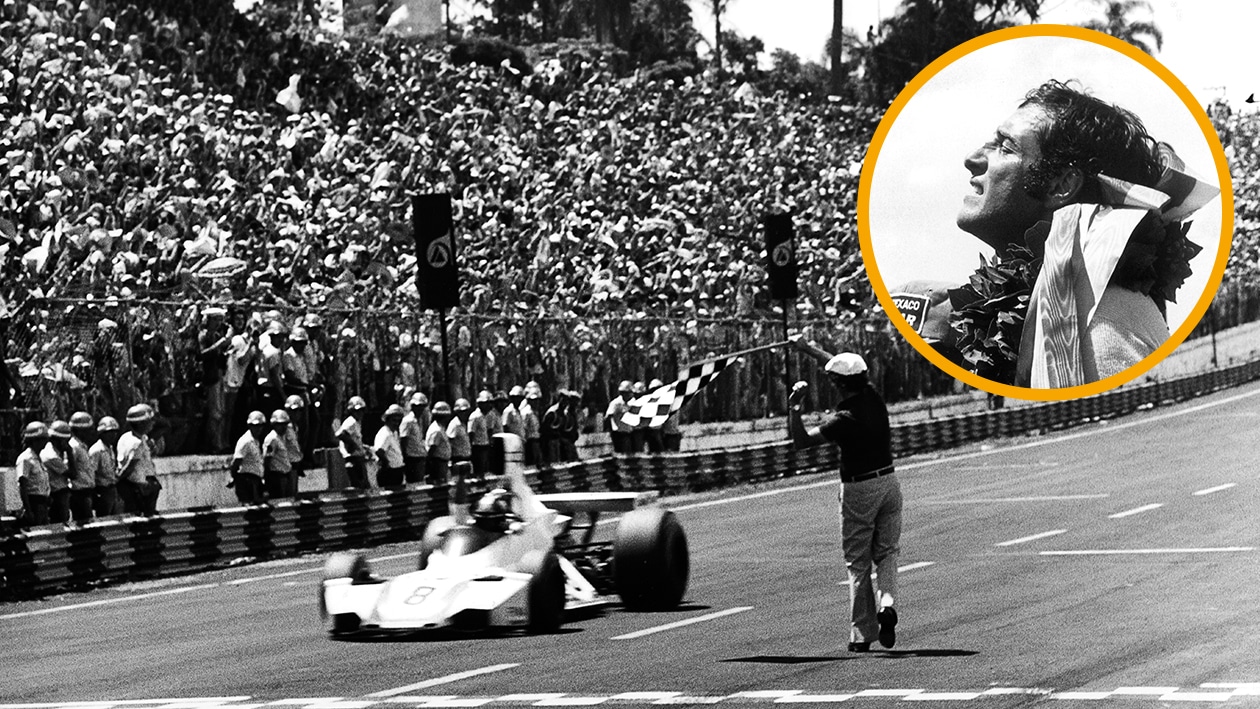Taken on the brink of the big time: why Carlos Pace is immortalised at Interlagos
Brazil has produced multiple F1 champions and grand prix winners but named the Interlagos circuit after one of its more obscure — Carlos Pace. Matt Bishop ponders the unrealised promise of a life cut cruelly short

Interlagos winner: Carlos celebrates victory in 1975 alongside Emerson Fittipaldi (left) and Jochen Mass
DPPI
Other than in 2020, in which year it was cancelled owing to Covid, the Brazilian Grand Prix has been an ever-present fixture on the Formula 1 world championship schedule since 1973; since 1972 if you count the first ever Brazilian Grand Prix, which was a non-championship F1 race. It has been held in September, October or November every year since 2004. Between 1981 and 2003 it was held in March or April. Prior to that, from 1973 to 1980, it had kicked off the F1 world championship in January or February, forming half of a South American season-opening double act with Argentina in each of those years bar 1976, when the installation of a military junta caused the Argentine Grand Prix to be cancelled. The 1972 Brazilian Grand Prix was an outlier – a March race – but it was a non-championship event as I say.
If, as I do, you have a special devotion to 1970s F1, at this time of year a part of you cannot help thinking that this coming Sunday we should be watching delayed highlights of F1 races in Brazil and Argentina on our black-and-white TV screens here in the UK, Italy, Spain, France, Germany et al. I realise that F1 sponsors nowadays enjoy the extra bite of the comms/PR and corporate hospitality cherries that new car launches and pre-season testing provide, but in general fans do not. All those who would vote for a January/February start to the F1 season in Argentina and Brazil, please say aye.

Emerson Fittipaldi won the first world championship Brazilian GP in front of an ecstatic home crowd in 1973
Bernard Cahier/Getty Images
There are no Brazilian or Argentine drivers in F1 now, and more’s the pity. They used to be plentiful, and they tended to perform disproportionately well in their and one another’s home grands prix. Carlos Reutemann, an Argentine, won the Brazilian Grand Prix four times, and F1’s three Brazilian world champions, Emerson Fittipaldi, Nelson Piquet and Ayrton Senna, won at home twice each, as did Felipe Massa, who claims to be the fourth Brazilian F1 world champion, but we will not go there in this column. Fittipaldi won the Argentine Grand Prix twice, while the greatest Argentine who ever drove a race car, Juan Manuel Fangio, won his home grand prix four times.
There have been no Argentine Grands Prix this century – the last took place in 1998 – and only one Argentine F1 driver, Gaston Mazzacane, who drove the last of his 21 grands prix at Imola in 2001. The Brazilian Grand Prix remains an F1 world championship mainstay, but no Brazilian driver has raced in F1 since Pietro Fittipaldi, who drove the last (so far) of his two grands prix at Abu Dhabi in 2020. Acutely aware of the economic importance of Brazil, a hefty proportion of whose 200-plus million citizens had long been F1 fans, Bernie Ecclestone always worked hard and successfully to pull whatever strings he could to place Massa and Rubens Barrichello in competitive F1 drives, notably with Ferrari, whose strings Ecclestone was always adept at pulling. But that is not how F1 works any more. Hence: no Brazilian F1 drivers these days.

F1’s rookies for the 2000 season: Jenson Button and Nick Heidfeld were there for the long-term. Gaston Mazzacane (left), less so
Torsten Blackwood/AFP via Getty Images
It is perhaps something of an anomaly that the home of the Brazilian Grand Prix, Interlagos, in São Paulo, is named not after any of the multiple world champions and prolific grand prix winners listed above, but after the one Brazilian whom I have not mentioned so far who has a grand prix win to his name. Or, rather, had, not has. And perhaps that — the James Dean-like ‘halo’ conferred automatically on all celebs who die young — is the reason why since 1985 the official name of Interlagos has been Autodromo Jose Carlos Pace. Pace was a very good F1 driver, if not a truly great one. He started 72 grands prix, spraying bubbly from six F1 podiums, once atop the central plinth, appropriately at Interlagos, in 1975. He bagged five fastest laps and secured one pole position. But he was killed, aged just 32, in a light aircraft accident near his native São Paulo, in March 1977, when he was about to hit the big time.
Big time? You don’t believe me? Well, he had just begun his third full season with Ecclestone’s Brabham team, and Bernie, never an easy man to impress, thought he was brilliant. “If Moco [Pace’s nickname] had survived, I’d never have needed Niki [Lauda],” he famously said: high praise indeed. But was it faint praise as well as high praise? I think not. Perhaps Pace was not quite as good as Lauda — who was? — but he held his own as near as dammit with t’other Carlos, i.e. Reutemann, winning fewer races and scoring fewer points but trying harder when their cars were not handling with the balance and fluidity that brought out the too often latent genius in Lole.

Pace’s only GP win came at Interlagos in 1975
Bernard Cahier/Getty Images
Moreover, Pace began 1977 extremely well. The previous season, 1976, had been a terrible one for Brabham, the team’s Alfa Romeo flat-12s powerful and torquey but heavy and unreliable. However, those issues had been largely ironed out by the start of 1977. In the season opener, in Argentina, Pace finished second, and he might well have won had he not been almost overcome by heat exhaustion towards the end of the race, allowing Jody Scheckter, at that time the fittest driver in the sport, to nip past and pinch the win for Wolf. Pace led next time out, at home in São Paulo, but his Brabham and James Hunt’s McLaren made contact while Hunt was challenging him for the lead: the McLaren was undamaged whereas Pace had to pit for repairs. He pushed hard for a while but eventually became a lap-34 retirement. He qualified on the front row for race three, at Kyalami, alongside his Interlagos assailant Hunt, but he botched his start, dialling up too many revs, resulting in ruinous wheelspin, had to make an unscheduled stop for fresh rubber, and faded to 13th at flag-fall.
After those three races he was by all accounts very upbeat, massively looking forward to getting cracking with the forthcoming European season, as we used to call it. His Brabham-Alfa BT45B was fast, driveable and well sorted, and he was heard to whisper more than once that he thought he might have an outside chance of winning the 1977 world championship with it. He did not, for 13 days after Kyalami came the tragic and unnecessary end.
